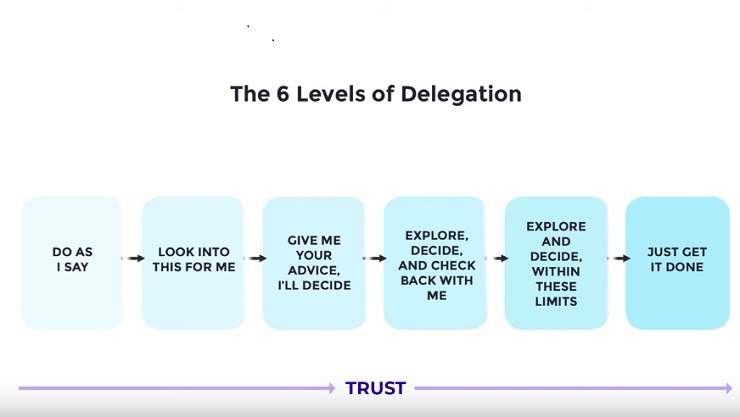A diagnosis of a chronic, incurable illness nearly derailed Ari Meisel’s entrepreneurial career. Changing his diet and training his body significantly improved his health—but there was one final piece that helped everything in his life and business click into place: reducing his stress levels by outsourcing and delegating.
Today, Meisel is a best-selling author, productivity coach, and co-founder of outsourcing platform Leverage. Based on what he personally learned and accomplished, he developed the Less Doing, More Living system that teaches founders how to optimize, automate, and outsource everything in their businesses. Meisel is also the instructor of Foundr’s Productivity Machine course.
And lucky for us, Meisel agreed to join us for this brief video to share how he delegates so effectively. Check it out below, and then read on to get a detailed breakdown of this process:
EXCLUSIVE FREE TRAINING: Successful Founders Teach You How to Start and Grow an Online Business
Delegation: It’s Not What You Think
As entrepreneurs, we’re constantly being told to delegate, delegate, delegate. But do we actually know what it means? If you look it up in the Merriam-Webster dictionary, to delegate means “to assign responsibility or authority.”
Those of us who struggle with trust issues or think delegation isn’t for us probably misunderstand how to delegate as a leader. As Meisel stresses, delegation isn’t black and white, meaning:
- You don’t have to outsource an entire project.
- You don’t have to outsource none of it either.
According to Meisel, there are six levels of delegation. “A lot of people, when they have hesitancy towards delegating, it’s because they’re stuck in one or the other,” he says.
So let’s break down the six levels and how entrepreneurs can use them to become less stressed and more productive.
The Six Levels of Delegation, According to Ari Meisel
Level 1: Do As I Say
The first and most basic level of delegation is “do as I say.” But the problem is that entrepreneurs think this means they’ll end up doing all the work anyway for a small task, such as buying a plane ticket, by having to describe exactly where to look and detailing the parameters. With this in mind, many entrepreneurs throw up their hands and say, “I’ll just do it myself!”
But that would be a mistake. As Meisel points out, “do as I say” is meant for tasks that don’t require much information or skill. For instance, “buy me a bath mat on Amazon” or “post this image on Twitter with this hashtag.”
Yes, you do a little bit of the work upfront, but your assistant runs the last mile. With simple tasks like these, it’s fine to work to a certain point and then let someone else finish it for you. That’s still minutes saved that you could spend doing something that you’re the best at.
Level 2: Look Into This for Me
Delegate a task with “look into this for me” when it’s something you know nothing about. An example that Meisel gives is if someone recommends a certain CRM you’ve never heard of, then you might want to have someone on your team get more information about the software before you buy it.
“It’s almost like a human Google at that point,” he says, “and that’s totally fine because you can just move on again. You don’t have to worry about it. You don’t have to think about it.”
Your assistant can do the research for you, bring you the information, and you can make an informed decision from there.
Meisel says you can start at one level of delegation and move to another. For example, if you’re thinking of getting a new car, you could tell your assistant, “Look into this for me.” But if you already know you really like Subarus and need some in-depth research on different models, it’s time to move on to the next level of delegation: “Give me your advice, and I’ll decide.”
Level 3: Give Me Your Advice, and I’ll Decide
So with the Subaru example, you could tell your assistant, “Go do some research on the best models, come back to me with three options, and I’ll pick one.” They’ll do the in-depth research, narrow down the results based on your parameters, and then give you the three best options. From there, you just make a decision.
If you’re able to start delegating at this level, that’s a good sign. Why? Because it shows you are trusting your assistant to do everything they can and explore all the options for you. You’re letting go of a bit of control. Plus, reducing the information overload by trusting your assistant’s advice helps you to make decisions more quickly. As a business owner, it’s important to make fast, informed decisions and then move on to growing your business.
Level 4: Explore, Decide, and Check Back With Me
Now we’re getting into the upper levels of delegation: In level four, you’re going to let someone else decide for you and then check back with you before they execute it.
Let’s go back to the CRM system example. There are hundreds of CRMs out there. None of them will be perfect for you, but it’s not worth your time to go diving into the research on every single one. It’s a better use of your time and resources to pick a person on your team (perhaps a marketing assistant or a salesperson) who uses CRMs a lot and knows about them. They will be the best person to make an informed decision about which software to buy.
“No matter how much time you spent, you’re still not going to be in a position to make as good of a decision as somebody who’s been working with that industry or those tools for a long time,” Meisel says.
But what about those of us who are control freaks? How can we let go of a decision for a business that we own?
“A lot of times when you’re trying to get comfortable with this level of trust,” says Meisel, “what you have to weigh is the balance between the gravity of the project at hand and the expertise of the person that you’re asking to do it.”
So if you need someone to choose a bath mat for you, worst-case scenario, you get a bad product or spend too much money. But with something like email marketing, you shouldn’t invest the time to decide. You need to enlist the help of someone with more expertise than you in that area. So it really depends on the type of task. If it’s a weightier decision that requires more expertise, find the person with that expertise.
EXCLUSIVE FREE TRAINING: Successful Founders Teach You How to Start and Grow an Online Business
Level 5: Explore and Decide, Within These Limits
Meisel goes by this rule: “If it’s a decision that doesn’t involve more than $100, I don’t want to know about it.”
For example, when Meisel needed to set up a personal webpage, he delegated the decision to someone else. An hour later, a charge for $79 for about.me showed up on his phone. But because it was under $100, well beneath the threshold he had set, he didn’t care. The person had done exactly what he had asked for.
So with these decisions, you can tell your assistant or team member that you don’t even want to know about a decision up to a certain threshold.
Level 6: Just Get It Done
Alright, now we’re at the final level of delegation—it’s Meisel’s favorite one! That’s because this is true delegation, where you completely trust your assistant or team member to handle the task without needing to check in with you. Even so, he admits there are not a lot of situations where you would say, “Just get it done.”
One example from his own life is when he had a motorcycle registered in his name that he and his father were using. One day, the registration had expired, but his dad wanted to use it.
Someone had to go to the DMV to get it renewed. It had to get done, but Meisel didn’t want to waste time doing it himself. So he delegated this task to his assistant. A seemingly simple task turned out to be quite arduous, and by the end of it, when he found out how much effort it had taken her, he was grateful he hadn’t done it himself. As a business owner, a personal task that draining would’ve derailed the projects he was working on.
Recap: The Six Levels of Delegation
As Meisel points out, a project can fall into any one of these six levels, and that same project can move through some of these levels.
“While that may sound too fluid for some people, I want that,” Meisel says. “I don’t want you to get stuck in this idea that it’s either ‘give it to somebody’ or ‘do it myself.’”
Take Action! A Simple Exercise so You Can Start Delegating Today
Meisel gives us an exercise to get started on how to delegate effectively.
- Step 1: Write down 10 things you need to get done that you don’t want to do or shouldn’t be doing yourself.
- Step 2: Think of the six levels of delegation and notice that as you move through the levels, you move from outsourcing (“do as I say”) down to true delegation (which is “just get it done”). Ultimately, you want to get to level six, “just get it done.”
- Step 3: Take those 10 things and see which of the six levels they might fall under, and that will clue you in to where your issues are and which providers you may need to hire to get these things done.
Online Tools You Can Use to Delegate Tasks
If you’re looking for virtual assistants and other professionals to hire so you can start delegating tasks, check out the following tools:
- Fancy Hands connects you with US-based virtual assistants who can help you complete personal or business tasks, from booking travel to paying bills. Their lowest plan is $29.99, and you can get five requests per month (typically up to 20 minutes of work per request). They also have options if you need a dedicated virtual assistant.
- Magic offers personal assistants for 50 cents per minute and business assistants for 59 cents per minute. Send a message through their app, and Magic will assign someone from their team of assistants to complete your request.
- Zirtual has a team of US-based assistants that can complete personal and business tasks such as email management, social media scheduling, and vacation research. Plans start at $449/month for 12 hours of task work.
- Design Pickle might be a good fit for you if you’re looking to outsource graphic design tasks. This website will pair you with a dedicated graphic designer to do the skilled work for you. Plans start at $399/month for unlimited requests and unlimited revisions.
What Will You Delegate?
As a founder, it can be hard to let go of any part of your business. Sometimes we fall into the mental trap of thinking, “If I want it done right, I’ll have to do it myself.” This is false! If you do delegation correctly, the tasks will get done and by someone who’s better suited to do them.
You can’t scale your business if you don’t delegate. There is only one you. Since you’re the founder of your business, your time and select skills are highly valuable in the areas that you should be spending them in. For the tasks that don’t grow your business or the tasks where you don’t know what you’re doing, you need to hand them off to someone else or risk slowing your growth.
Reviewing Meisel’s six levels of delegation, notice how it goes from simpler to more complex tasks. If you’re not at the true delegation level of six yet, it’s okay. You can start with level one (“do as I say”) and gradually move down the levels until you’re a delegation master.
Which tasks will you start delegating? Share your top three in the comments below!
EXCLUSIVE FREE TRAINING: Successful Founders Teach You How to Start and Grow an Online Business


















